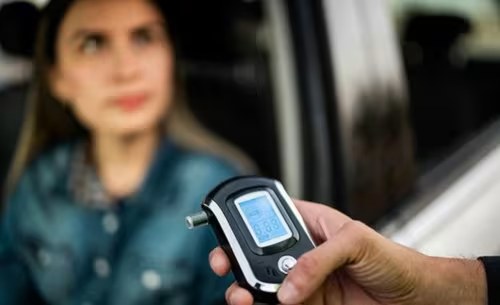Disclaimer: This guest post was written by a third party and is for informational purposes only. It does not constitute legal advice or create an attorney-client relationship with The Meehan Law Firm. For legal advice, please contact our office.
%20(1).webp)
%20(1).webp)
Police officers in California go through extensive training to spot behaviors and signs that indicate a person is driving under the influence. However, a police officer may also initiate a DUI investigation after stopping a driver for another reason like expired registration or a moving violation. While many police officers will pull a driver over merely because they are leaving a bar or restaurant, or are driving late at night, they must state a valid reason for stopping the driver (though it may be made up). Here are some common reasons for DUI stops that could indicate a potentially impaired driver.
1. Erratic or Dangerous Driving Behavior
A common reason drivers are pulled over for DUI is that law enforcement observes erratic or unsafe driving behavior. This includes swerving between lanes, making abrupt or illegal turns, tailgating, and driving significantly over or under the speed limit. Someone driving in this manner suggests he or she may be impaired and unable to safely control the vehicle. If an officer observes any of these signs, very likely they will initiate a traffic stop. The officer may also indicate they are concerned the driver was suffering from a medical condition, so they pulled them over for a welfare check.
2. Failure to Obey Traffic Signals
One of the common reasons for DUI stops is ignoring stop signs, red lights, or failing to yield to pedestrians. Not obeying traffic signals (running a red light) or delayed response to traffic signals (failure to proceed after the light turns from red to green) may be an indication the driver’s judgment is impaired due to alcohol or drugs. Even if a driver is not intoxicated, failure to follow basic traffic laws is often enough reason for police to initiate a DUI investigation.
3. Driving with Defective Vehicle Equipment
Broken tail lights, malfunctioning headlights, or expired registration tags give law enforcement a legal reason to stop your vehicle. Once you are pulled over for a minor equipment violation, if the officer detects any signs of intoxication, such as the smell of alcohol or slurred speech, they may initiate a DUI investigation. Even if the driver is not pulled over for a DUI, minor infractions can lead to more significant consequences if impairment is suspected.
4. Failure to Maintain Lane Control
Swerving in and out of lanes, drifting onto the shoulder, or crossing over the center line are all erratic behaviors that could be seen as an indicator of impairment. If you’re not able to keep your car in its lane, you increase the likelihood of getting pulled over for suspicion of DUI.
5. Excessive Speeding
Driving significantly over the speed limit can also lead to being pulled over and possibly arrested for DUI. Law enforcement officers often monitor high-speed areas, especially late at night or after events where alcohol consumption is common.
6. Driving Too Slowly
While speeding is a red flag, driving unusually slow , especially on a highway or in zones where traffic is expected to flow faster, can also draw attention. Slow driving might suggest that the driver is overly cautious or unaware of their surroundings due to intoxication. If a police officer suspects impairment, the driver may be pulled over for DUI.
7. Driving at Night or During Holidays
Around the holidays, such as New Year's Eve, Memorial Day, and July 4th, when alcohol consumption is more common, police officers are on high alert. During these periods, law enforcement often sets up DUI checkpoints or increases patrols to catch impaired drivers. Simply driving during these times increases your likelihood of being pulled over, and arrested if you show any signs of intoxication.
8. Signs of Impairment During the Stop
Once a police officer pulls over an individual they will assess his behavior closely. Signs of impairment include bloodshot eyes, the smell of alcohol, slurred speech, unsteady on your feet, and difficulty responding to basic questions. Even if pulled over for a minor traffic violation, these signs could lead the officer to conduct a DUI investigation, including field sobriety tests or a breathalyzer test. Underage drivers are required to submit to a Preliminary Alcohol Screening (PAS) test if requested by an officer or another test if you prefer not to complete the PAS test. If an underage driver is arrested, it is crucial to seek legal guidance from an experienced DUI Under 21 Lawyer.
9. Refusing a Breathalyzer or Field Sobriety Test
In California, under the state’s implied consent law, drivers are required to submit to chemical testing (such as a breathalyzer or blood test) if they are lawfully arrested for DUI. Refusing to take these tests can result in an automatic license suspension and could lead to additional charges like resisting arrest, or enhanced penalties in court. While you have the right to refuse a field sobriety test, and the Preliminary Alcohol Screening device which was offered as a field sobriety test.
10. DUI Checkpoints
Reasons for DUI stops typically include behavior or driving patterns that signal impairment, or sometimes, just the presence at a DUI checkpoint itself. California law allows DUI checkpoints, predetermined locations where drivers get stopped to be checked by police officers for signs of intoxication. If an officer suspects a driver has been drinking, they can request a field sobriety test or a preliminary alcohol screening (PAS) test. The checkpoints are supposed to be placed in locations where DUIs are common, and coincidentally, they are often located on the weekends near popular drinking locations. An Underage DUI Attorney can provide legal guidance if an underage driver is stopped at a DUI checkpoint, required to submit to a Preliminary Alcohol Screening (PAS) test, fails the test, and is subsequently arrested. If arrived to a DUI Checkpoints or pulled over for DUI: pull over and stop safely, be polite, and avoid giving in to field sobriety tests.
Legal Representation
The Meehan Law Firm provides expert legal representation for individuals facing DUI charges, led by attorney Michael Meehan. With extensive experience in DUI defense, our firm is committed to protecting your rights and securing the best possible outcome for your case. Learn more about The Meehan Law Firm to understand how we can assist you in navigating your DUI charges and building a strong defense. Stay up to date with the latest information on DUI charges and their consequences by visiting our blog. Learn about legal updates, potential penalties, and effective defense strategies.
(844) 4-DUI STOP
Categories
Need Help?
Free Consultation, discreet, and no obligation- talk to an attorney.
More Blogs

How Can You Defend Someone Who Is Guilty?
Defense attorneys protect constitutional rights, ensure due process...
Read More..
Why a Second DUI Might Be Your Wake-Up Call
Facing a Second DUI in California: Why It Should Be Your Wake-Up Call..
Read More..
How To Spot a Bad DUI Lawyer in 10 Minutes or Less
Choosing the Right DUI Lawyer in California: Spotting Red Flags Early...
Read More..



